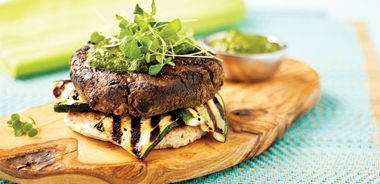Lentil Goats Cheese Burgers with Spinach Pesto

Serves 6
Infusing these burgers with creamy goats’ cheese and adorning them with a lively pesto solves the concern that lentil burgers are always too, well, earthy. In lieu of zucchini, other good vegetable topping options include tomato, cucumber and/or barbecued eggplant slices.
1 1/4 cup (310 ml) dried green lentils 3 cups (750 ml) baby spinach 1/2 cup (125 ml) flat-leaf parsley 2 Tbsp (40 ml) extra-virgin olive oil Juice of 1/2 lemon 2 garlic cloves, crushed, divided 1/2 tsp (2 ml) salt, divided 1/2 cup (125 ml) wheatgerm or ground flaxseed 120 g soft goats’ cheese, crumbled 1/3 cup (80 ml) chopped walnuts 1 1/2 Tbsp (30 ml) balsamic vinegar 3 tsp (15 ml) Dijon mustard 3/4 tsp (4 ml) ground cumin 1/4 tsp (1 ml) black pepper 2 medium-sized zucchini Sprouts or micro-greens (optional) 6 organic wholegrain buns (optional)
Place lentils in medium-sized saucepan with 4 cups (1 L) water. Bring to a boil, reduce heat and simmer until lentils are tender, about 25 minutes. Drain lentils and set aside to cool.
As lentils are cooling, place spinach and parsley in food processor container and pulse until well chopped. Add olive oil, lemon juice, 1 garlic clove and 1/4 tsp (1 ml) salt to container and blend until well combined, wiping down sides as needed. Set aside.
Add lentils to food processor container and pulse until most of the lentils have broken down but are not completely smooth. Add remaining garlic, remaining salt, wheatgerm or flaxseed, goats’ cheese, walnuts, balsamic vinegar, mustard, cumin and black pepper; pulse until well combined. Form mixture into 6 equal-sized patties.
Slice zucchini in half along their width. Stand the 4 halves upright and slice each into 4 or 5 thin slices.
Preheat barbecue to medium. Brush burgers and zucchini slices with oil. Cook burgers for 4 minutes per side, or until they have developed a crispy crust. Cook zucchini slices until tender, flipping once, about 5 minutes.
If using buns, heat them on the barbecue for 1 minute, or until toasted. Serve lentil burgers topped with spinach pesto, zucchini slices and sprouts or micro-greens, if using.
Each serving contains: 1465 kilojoules; 18 g protein; 16 g total fat (4 g sat. fat, 0 g trans fat); 35 g total carbohydrates (3 g sugars, 15 g fibre); 289 mg sodium
source: "Vegie Burgers", alive Australia #18, Summer 2013





